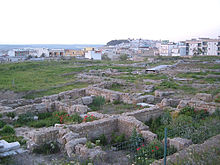Canusium
Canusium was an ancient Italian city in Apulia . It was on the right bank of the Aufidus (today Ofanto ) about 20 kilometers from the sea. In its place is now the Italian municipality of Canosa di Puglia .
history
Canusium was founded by Greece and was one of the most important cities in Apulia. According to legend, it is said to have been founded by Diomedes , just like the neighboring Arpi . This supposed city founder was also the namesake for the fertile plain surrounding Canusium, which was called Diomedis campi . Canusium is mentioned for the first time during the wars of the Romans against the Samnites , in which it took part on the side of the Samnites, but after repeated devastation of its territory by the Romans in 318 BC. BC to the consul Lucius Plautius Venox revealed. The city continued to mint its silver and copper coins with Greek script and remained bilingual until the imperial era .
Since the submission by the Romans, Canusium has apparently remained loyal to its new protective power. When, for example, after the battle of Cannae (216 BC), the remnants of the Roman army, which Hannibal had severely defeated, fled to the nearby Canusium, they were welcomed there with great courtesy. Canusium also stood firmly on the side of the Romans during the Second Punic War . During the Social War , however (91-89 v. Chr.) Was there as the other Apulian towns with Rome. It was found during the second campaign of this war in 89 BC. BC by Gaius Cosconius , who was probably praetor that year , besieged in vain. Appian incorrectly claims that Canusium was in 83 BC. Was the place of a battle between Sulla and the consul Gaius Norbanus, which ended unhappily for the latter. Obviously, the city had suffered a lot from the various acts of war, since Strabo mentioned that Canusium had lost much of its former importance in its time. Nevertheless, the city, which was built in 88 BC The municipality of Oufentina became a municipality , flourishing during the imperial period due to its trade. It had a port 90 stadia away from its mouth on the Aufidus and was a notable station on the Via Appia Traiana . Wool processing was an important industry that made a significant contribution to the city's prosperity .
Under Emperor Antoninus Pius , Canusium became Colonia in the middle of the 2nd century AD and was now called Colonia Aurelia Augusta Pia . The inhabitants suffered from a lack of drinking water, which was only remedied by an aqueduct donated by Herodes Atticus to improve the water supply . Of the numerous inscriptions from the imperial period that were found, a bronze plaque listing the patrons, magistrates and decurions from the year 223 is particularly interesting. Canusium has been the seat of a bishopric since the 4th century. In the 6th century it was still one of the most important places in Apulia. Later it was ravaged by the Saracens .
Archaeological finds
The remains of the ancient canusium included ruins of an amphitheater , a gate and a water pipe. A fort was built on the site of the ancient acropolis in the Middle Ages . The importance of the city is proven by many grave finds, especially from the 4th and 3rd centuries BC. For example, magnificent Apulian vases , probably made in Taranto , as well as Hellenistic so-called Canosiner vases made in local workshops, come from chamber graves cut into the rock .
literature
- Edward Herbert Bunbury: Canusium . In: William Smith : Dictionary of Greek and Roman Geography. London 1854.
- Christian Hülsen : Canusium . In: Paulys Realencyclopadie der classischen Antiquity Science (RE). Volume III, 2, Stuttgart 1899, column 1501 f.
- Felice G. Lo Porto: Canusium (Canosa di Puglia) Apulia, Italy . In: Richard Stillwell et al. a. (Ed.): The Princeton Encyclopedia of Classical Sites. Princeton University Press, Princeton NJ 1976, ISBN 0-691-03542-3 .
- Ekkehart Rotter: Apulia . Trips to Byzantine grotto churches, Norman cathedrals, Hohenstaufen forts and baroque buildings in Lecce. (= DuMont art travel guide ). 6th edition. Dumont Reise Verlag, Ostfildern 2012, ISBN 3-7701-4314-0 .
Web links
- Coins of Canusium (English)
Remarks
- ↑ Strabon 6, 283; Horace , Saturae sive sermones 1, 5, 92; Servius , Commentary on Virgil , Aeneid 11, 246.
- ↑ Titus Livius 25:12 ; Silius Italicus , Punica 8, 242.
- ^ Livy 9:20 ; Diodorus 19.10 .
- ^ Horace, Saturae sive sermones 1, 10, 30 with Scholia.
- ↑ Livius 22, 52 et seq .; Appian , Hannibalica 24 and 26; Cassius Dio , fragment 57, 29; among others
- ^ Livy 27:12 , 7.
- ↑ Appian, Civil Wars 1:42 ; 1, 52.
- ^ Appian, Civil Wars 1, 84.
- ^ Franz Fröhlich: Cornelius 392). In: Paulys Realencyclopadie der classischen Antiquity Science (RE). Volume IV, 1, Stuttgart 1900, Sp. 1545.
- ^ Strabo 6, 283.
- ↑ Pliny the Elder , Naturalis historia 3, 104; CIL 9, p. 35.
- ↑ Strabon 6, 283; Caesar , Civil War 1:24; Appian, Civil Wars 5, 57; among others
- ↑ Pliny, Naturalis historia 8, 190f .; Martial 14, 127; Suetonius , Nero 30; Athenaios 3, 97e; among others
- ↑ CIL 4, 344 .
- ↑ Horace, Saturae sive sermones 1, 5, 91.
- ↑ Flavius Philostratos , Vitae sophistarum 2, 1, 5.
- ↑ CIL 9,338 .
- ^ Prokop , De bello Gothico 3, 18; Paulus Deacon , Historia Romana 2, 22.
Coordinates: 41 ° 13 ' N , 16 ° 4' E
